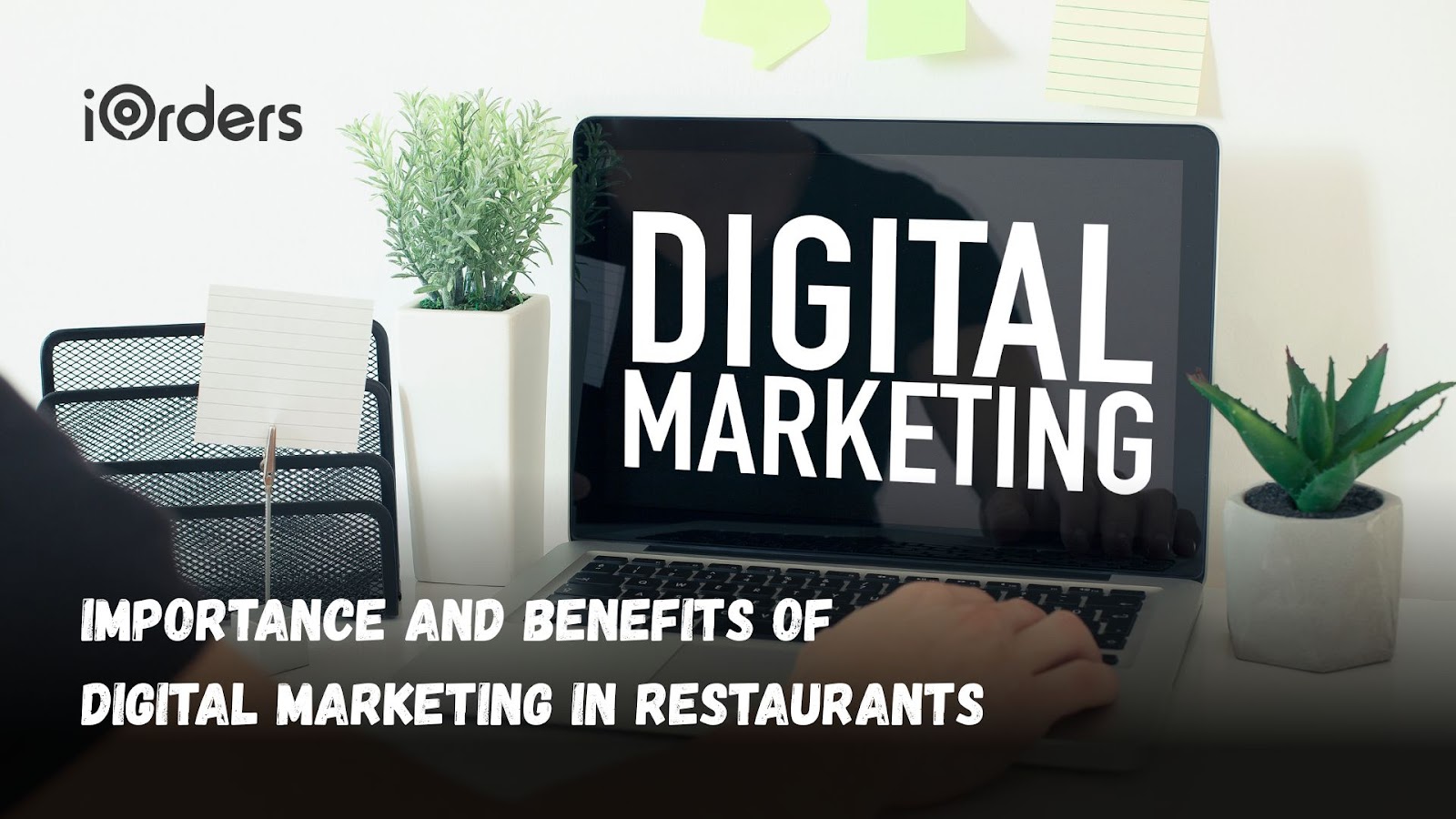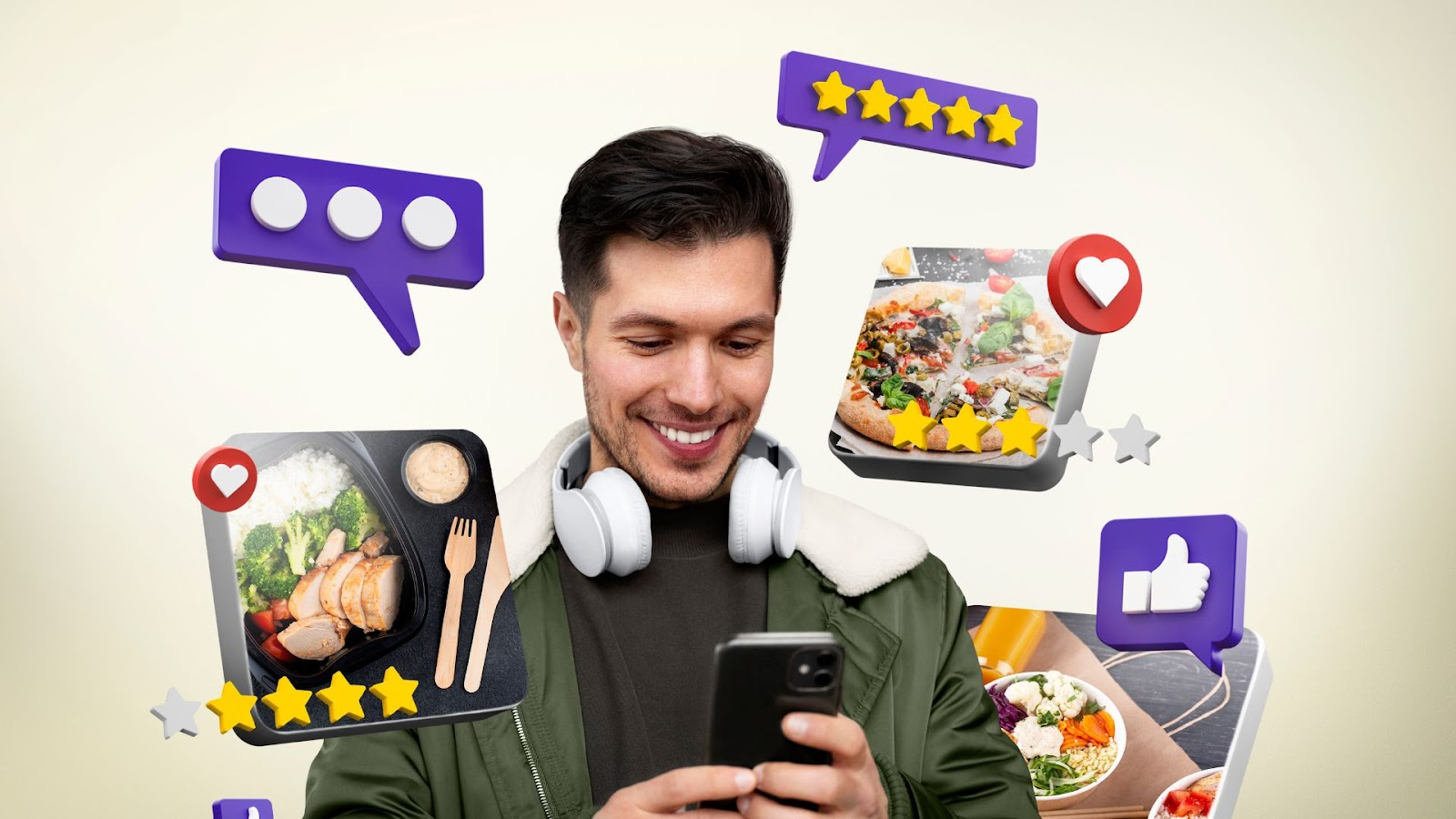October 8, 2025

Success in today’s restaurant industry demands more than simply great food; it requires reaching and engaging customers where they spend most of their time: online. Digital marketing allows restaurants to build a strong online presence, connect with diners, and promote menu offerings effectively.
This article looks at the advantages of digital marketing for restaurants and why using online strategies is key to attracting and retaining diners.
It used to be that making a restaurant famous meant putting up an ad in the local paper or splashing across the trendiest magazines. But today, that’s not where customers get their news from; it’s their phones. And to get your restaurant in front of their eyes, digital marketing becomes crucial.
Modern diners rely on search engines, review sites, and social platforms when choosing a place to eat. They scroll menus, compare ratings, and often make decisions before ever setting foot near your restaurant. Without a visible online presence, you risk losing diners to competitors who show up where they’re searching.
For restaurants, embracing digital marketing isn’t just about promotion; it’s about staying relevant, competing effectively, and winning loyalty in an online-first world.

Alt text: The Benefits of Digital Marketing
Digital strategies, including online search, social media, email marketing, and delivery services, enable restaurants to draw in new customers, retain loyal diners, and simplify operations. Here’s a breakdown of the key benefits restaurant owners can gain from employing digital marketing effectively:
1. Increases Visibility and Awareness: Digital marketing ensures your restaurant is easily discoverable by potential diners through search engines, social media, and targeted online ads. Being visible online increases the chances that diners will find your restaurant when searching for options nearby or looking for specific cuisines.
2. Improves Customer Engagement: Digital channels create two-way communication between your restaurant and diners. Social media posts, email campaigns, and online reviews allow for interaction that fosters a sense of community and encourages diners to keep coming back.
3. Enhances Customer Experience: Online reservations, delivery apps, and streamlined ordering platforms make it easier for customers to enjoy your restaurant’s offerings. A smooth, convenient experience builds trust and satisfaction.
4. Drives Positive Reviews and Referrals: Engaged customers are more likely to leave glowing reviews and recommend your restaurant to friends and family, amplifying your reputation and bringing in new diners.
5. Levels the Playing Field for Smaller Restaurants: Cost-effective digital marketing strategies allow small and midsize restaurants to compete with larger brands, reaching targeted audiences without massive advertising budgets.
6. Provides Measurable Results: Digital campaigns give clear tracking of ROI, customer behavior, and campaign performance, enabling restaurant owners to understand what’s working and refine strategies.
7. Delivers Higher ROI Than Traditional Ads: Targeted online ads reach the right diners more efficiently than traditional billboards, flyers, or radio spots, making every marketing dollar more effective.
8. Enables Personalization at Scale: Digital marketing allows restaurants to provide tailored experiences for each diner. By understanding customer preferences and behavior, restaurants can create a more relevant and engaging experience, which strengthens relationships and encourages repeat visits.
9. Supports Real-Time Optimization: Unlike fixed traditional ads, digital campaigns can be tested, tweaked, and improved instantly, ensuring maximum effectiveness and adaptability.
10. Highlights Unique Menu and Dining Experiences: Visual and persuasive online content allows restaurants to showcase their menu items, ambiance, and special offerings, attracting attention and standing out from competitors.
11. Builds Customer Loyalty: Consistent online engagement through emails, social posts, and loyalty programs encourages repeat visits and strengthens long-term relationships with diners.
12. Improves Customer Service: Digital platforms provide quick ways to answer questions, address complaints, and resolve issues, enhancing the overall customer experience and reputation.
When applied strategically, digital marketing for restaurants doesn’t just drive traffic; it fuels sustainable growth. For restaurant owners, these benefits far outweigh the operational costs of implementing a digital marketing campaign and have the potential to establish a strong competitive position in the market.
And with iOrders, it doesn’t even have to be complicated. We help restaurants turn their digital presence into real business results. By boosting visibility and enhancing the customer experience, our platform makes growing online simple and effective.

Alt text: Exploring the Different Types of Digital Marketing for Restaurants
Digital marketing isn’t a one-size-fits-all approach. For restaurants, it’s a multi-faceted strategy where each channel serves a unique purpose and brings distinct benefits. Combining several digital marketing types allows restaurant owners to reach diners at multiple touchpoints.
Here’s a closer look at the most effective digital marketing channels for restaurants:
Your website serves as the cornerstone of your restaurant’s online presence, and SEO (search engine optimization) ensures it appears in the right search results when potential diners are looking for options.
Why It Matters For Your Business:
Try: Regularly updating your menu and blog posts about special events to improve search rankings and attract new diners.
Social media platforms like Instagram, Facebook, and TikTok allow restaurants to engage directly with their audience and showcase their brand personality.
Why It Matters For Your Business:
Try: Creating a weekly Instagram story showcasing a “dish of the week” to encourage followers to visit or order online.
Email campaigns help restaurants maintain communication with their customers and encourage repeat visits.
Why It Matters For Your Business:
Try: Sending birthday discount emails as a simple yet effective way to make customers feel valued and incentivize them to return.
Targeted ads on Google, Facebook, and Instagram allow restaurants to reach specific audiences based on location, demographics, or interests.
Why It Matters For Your Business:
Try: Running a Google Ads campaign targeting “lunch near me” searches to attract nearby office workers looking for a quick meal.
Creating engaging content such as videos, blogs, and stories helps restaurants connect emotionally with diners.
Why It Matters For Your Business:
Try: Creating a YouTube page that focuses on showing your kitchen staff preparing iconic dishes, which can drive both online shares and in-person visits.
Partnering with local food bloggers or influencers can amplify your reach and credibility.
Why It Matters For Your Business:
Try: Inviting a local influencer for a tasting event and encouraging them to post about the experience on social media.
Digital loyalty programs, which you can offer through iOrders, reward repeat customers and encourage ongoing engagement.
Why It Matters For Your Business:
Try: Offering a free appetizer after every five orders to keep customers coming back for more while also promoting your menu consistently.
With the help of these digital marketing channels, restaurants can create a cohesive strategy that drives visibility, engagement, and long-term growth.

Alt text: Create a Digital Marketing Strategy for Your Restaurant
If you’re unsure how to begin, here’s a clear step-by-step guide for restaurant owners to follow when creating an effective digital marketing plan. Don’t hesitate to experiment with different approaches and pivot if the results aren’t meeting your expectations after a few weeks.
1. Define Your Goals: Start by identifying what you want to achieve with digital marketing. Goals could include increasing foot traffic, boosting online orders, improving customer retention, or growing social media engagement. Clear goals guide your next decisions on channels, campaigns, and content, and make it easier to measure success later.
2. Understand Your Audience: Know who your diners are, what they value, and where they spend time online. Create customer profiles based on demographics, preferences, and dining habits. Doing this helps you tailor messaging, promotions, and content to attract and retain the right customers.
3. Audit Your Current Digital Presence: Review your website, social media accounts, email campaigns, and online reviews. Identify strengths, weaknesses, and opportunities. This step helps you understand what’s working, what needs improvement, and which channels should be prioritized in your strategy.
4. Choose the Right Digital Channels: Select the platforms and tools that best reach your target audience. This may include social media (Instagram, Facebook, TikTok), search engine optimization (SEO), email marketing, online ads, and loyalty apps. Each channel serves a different purpose, so consider how they work together for maximum impact.
5. Create a Content Plan: Develop a content calendar with posts, promotions, videos, blogs, and newsletters. Focus on engaging, high-quality content that showcases your menu, staff, events, and restaurant personality. Regular updates keep your audience interested and reinforce brand identity.
6. Implement and Monitor Campaigns: Launch your campaigns across chosen channels, ensuring that messaging is consistent and on-brand. Monitor performance daily or weekly to catch issues early and make adjustments as needed.
7. Measure and Optimize: Track KPIs such as website traffic, social media engagement, reservations, and online orders. Analyze what works and refine campaigns to improve ROI. Digital marketing is iterative; continually optimizing your strategy ensures long-term growth and stronger customer connections.
By following these steps, restaurant owners can build a focused, flexible digital marketing strategy that drives engagement, attracts new diners, and supports long-term growth.

Today’s competitive foodservice market demands that your restaurant brand stands out online, and iOrders provides the tools to make that easier. With iOrders, restaurant owners can manage online ordering, reservations, and loyalty programs all from one platform, creating a smooth experience for customers.
We help amplify your digital presence through integrated marketing features. Automated email campaigns and promotional offers keep diners engaged, while easy social media integration allows restaurants to showcase menus, special events, and unique dining experiences to a wider audience.
By simplifying campaign management, enhancing visibility, and supporting engagement, iOrders allows restaurant owners to market their brand effectively. With our platform, you can attract new customers and build lasting relationships with loyal diners, without adding extra operational complexity.
Want to see how iOrders can transform your restaurant’s digital marketing strategy? Book a free demo today!
1. Why is digital marketing important for restaurants?
Digital marketing boosts online visibility, attracts new diners, and engages loyal customers. In today’s online-first dining environment, it’s essential to stay competitive.
2. What are the most effective digital marketing channels for restaurants?
Restaurants can make use of multiple channels: websites with SEO, social media, email marketing, online ads, content and video marketing, influencer partnerships, and loyalty programs. Each channel targets diners differently and adds unique value.
3. How can small restaurants compete with larger brands online?
Even small restaurants can succeed by using cost-effective strategies, targeting the right audience, and offering personalized campaigns that resonate with their diners. Strategic use of digital tools levels the playing field.
4. How do I measure the success of my digital marketing efforts?
Track key metrics like website traffic, social media engagement, email open and click rates, online reservations, and delivery orders. Monitoring these KPIs helps refine strategies and maximize ROI.
5. How can iOrders help with restaurant digital marketing?
iOrders integrates online ordering, reservations, loyalty programs, email campaigns, and social media management into one platform. It simplifies marketing efforts, improves customer engagement, and helps restaurants attract more diners effectively.